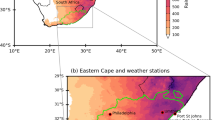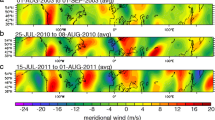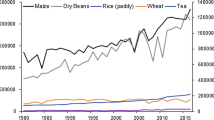Abstract
The present study acknowledged climate variability induced periodic variation in localized extreme weather event occurrences under diverse agro-eco regions of Eastern Himalayas of India during the past five decades. The widespread rise in warm nights (TN90p; 0.31–1.67 days year−1), reduced daily rainfall intensity (SDII), and changes in other weather extremes, viz. temperature and precipitation extremes, signified clear signals on regional atmospheric warming across eastern India. The agro-ecological regions under extended Bramhaputra valley and coastal belts of south Bengal experienced the most persistent shifts in temperature extremes, while the upper Himalayan range extended from North Bengal to Arunachal Pradesh experienced the steepest decline in average daily rainfall intensity and other absolute quantitative estimates of precipitation extremes over past five decades. Together with El Niño and La Niña events, large-scale global atmospheric circulations particularly expansion of warmer Pacific Warm Pool (PWP) and changes in Atlantic Meridional Mode (AMM) contributed to the periodic dynamics in weather extreme occurrences from monthly to annual time scale over eastern India. Our findings will be useful for better understanding of regional climatology, designing, and successful implantation of location-specific suitable agricultural policies towards climate change adaptation in near future.



Similar content being viewed by others
Availability of data and material
The dataset is under the copyright of India Meteorological Department, Pune. The dataset will be available on reasonable request.
Code availability
The R code will be available on reasonable request.
References
Abul Basher Md, Stiller-Reeve MA, Saiful Islam AKM, Bremer S (2017) Assessing climatic trends of extreme rainfall indices over northeast Bangladesh. Theor Appl Climatol. https://doi.org/10.1007/s00704-017-2285-4
Akhoury G, Avishek K (2020) Global atmospheric changes versus the Indian rainfall variation. Arab J Geosci 13:553. https://doi.org/10.1007/s12517-020-05478-5
Chakraborty D, Sehgal VK, Dhakar R, Varghese E, Das DK, Ray M (2018) Changes in daily maximum temperature extremes across India over 1951–2014 and their relation with cereal crop productivity. Stoch Environ Res Risk Assess Stoch Env Res Risk A 32(11):3067–3081. https://doi.org/10.1007/s00477-018-1604-3
Chattopadhyay S, Jhajharia D, Chattopadhyay G (2011) Univariate modelling of monthly maximum temperature time series over northeast India: neural network versus Yule-Walker equation based approach, 1955–2007. Meteorol Appl 18:70–82. https://doi.org/10.1002/met.211
Choudhury BU, Das A, Ngachan SV, Slong A, Bordoloi LJ, Chowdhury P (2012) Trend analysis of long term weather variables in mid altitude Meghalaya, North-East India. J Agric Phys 12:12–22
Dahutia P, Pathak B, Bhuyan PK (2018) Aerosols characteristics, trends and their climatic implications over Northeast India and adjoining South Asia. Int J Climatol 38:1234–1256. https://doi.org/10.1002/joc.5240
Dang S, Yu K, Tao S, Han T, Zhang H, Jiang W (2020) El Niño/Southern Oscillation during the 4.2 ka event recorded by growth rates of corals from the North South China Sea. Acta Oceanol Sin 39(1):110–117. https://doi.org/10.1007/s13131-019-1520-5
Goddard L, Gershunov A (2021) Impact of El Niño on weather and climate extremes. In El Niño Southern Oscillation in a changing climate. Geophys Monogr Ser 253, McPhaden MJ, Santoso A, Cai W, (Eds). First Ed., pp. 361–375. https://doi.org/10.1002/9781119548164.ch16
Guhathakurta P, Sreejith OP, Menon PA (2011) Impact of climate change on extreme rainfall events and flood risk in India. J Earth Syst Sci 120(3):359–373. https://doi.org/10.1007/s12040-011-0082-5
Hurst H (1951) Long term storage capacity of reservoirs. T Am Soc Civ Eng 6:770–799
Ihara C, Kushnir Y, Cane MA, Victor H, De La P (2006) Indian summer monsoon rainfall and its link with ENSO and Indian Ocean climate indices. Int J Climatol 27(2):179–187. https://doi.org/10.1002/joc.1394
IPCC (2013) Climate change 2013: the physical science basis. Contribution of Working Group I to the Fifth Assessment Report of the Intergovernmental Panel on Climate Change [Stocker TF, Qin D, Plattner G-K, Tignor M, Allen SK, Boschung J, Nauels A, Xia Y, Bex V, Midgley PM (eds)]. Cambridge University Press, Cambridge, United Kingdom and New York, NY, USA, 1535 pp.
Jaswal AK (2010) Changes in total cloud cover over India based upon 1961–2007 surface observations. Mausam 61(4):455–468
Jhajharia D, Singh VP (2011) Trends in temperature, diurnal temperature range and sunshine duration in northeast India. Int J Climatol 31:1353–1367. https://doi.org/10.1007/978-3-319-74494-0_14
Jhajharia D, Roy S, Ete G (2007) Climate and its variation: a case study of Agartala. J Soil Water Conserv 6(1):29–37
Jhajharia D, Shrivastava SK, Sarkar D, Sarkar S (2009) Temporal characteristics of pan evaporation trends under the humid conditions of northeast India. Agric for Meteorol 149(5):763–770. https://doi.org/10.1016/j.agrformet.2008.10.024
Jhajharia D, Yadav BK, Maske S, Chattopadhyay S, Kar AK (2012) Identification of trends in rainfall, rainy days and 24 h maximum rainfall over subtropical Assam in Northeast India. C R Geosci 344:1–13. https://doi.org/10.1016/j.crte.2011.11.002
Jhajharia D, Pandey PK, Pandey V, Dabral PP, Choudhary RR, Kumar R, Singh VP (2018) Changes in sunshine duration in humid environments of Agartala (Tripura), India. Clim Chang Impacts 15–24. https://doi.org/10.1007/978-981-10-5714-4_2
Jhajharia D, Pandey PK, Tapang T, Laji S, Dahal K, Choudhary RR, Kumar R (2019) Trends in sunshine duration in humid climate of Northeast India: a case study. Urban Ecol, Water QualClim Chang 181–191. https://doi.org/10.1007/978-3-319-74494-0_14
Johansen S, Juselius K (1990) Maximum likelihood estimation and inference on cointegration—with applications to the demand for money. Oxf Bull Econ Stat 52(2):169–210
Joshi MK, Rai A (2014) Combined interplay of the Atlantic multidecadal oscillation and the interdecadal Pacific oscillation on rainfall and its extremes over Indian subcontinent. ClimDyn. https://doi.org/10.1007/s00382-014-2333-z
Karki R, Hasson S, Gerlitz L, Talchabhade R, Schickhoff U, Scholten T, Böhner J (2019) Rising mean and extreme near‐surface air temperature across Nepal. Int J Climatol. https://doi.org/10.1002/joc.6344
Klein Tank AMG, Peterson TC, Quadir DA, Dorji S, Zou X, Tang H, Santhosh K, Joshi UR, Jaswak AK, Kolli RK et al (2006) Changes in daily temperature and precipitation extremes in central and south Asia. J Geophys Res 111:D16105. https://doi.org/10.1029/2005JD006316
Kumar P (2021) Impact of climate change and surface energy (Im) Balance on North-East India monsoonal rainfall. J Clim Change 7(2):35–47. https://doi.org/10.3233/JCC210010
Mandal DK, Mandal C, Singh SK (2016) India agro-ecological regions (revised), ICAR-NBSS&LUP Publ. No. 170, ICAR-NBSSLUP, Nagpur, India, pp 1–73
Misra V, Groenen D, Bhardwaj A, Mishra A, Bharadwaj A (2016) The warm pool variability of the tropical northeast Pacific. Int J Climatol 36:4625–4637. https://doi.org/10.1002/joc.4658
Nikumbh AC, Chakraborty A, Bhat G (2019) Recent spatial aggregation tendency of rainfall extremes over India. Sci Rep 9(1):1–7. https://doi.org/10.1038/s41598-019-46719-2
Panda DK, Kumar A (2014) The changing characteristics of monsoon rainfall in India during 1971–2005 and links with large scale circulation. Int J Climatol 34:3881–3899. https://doi.org/10.1002/joc.3948
Prasad KD, Singh SV (1996) Forecasting the spatial variability of the Indian monsoon rainfall using canonical correlation. Int J Climatol 16:1379–1390. https://doi.org/10.1002/(SICI)1097-0088(199612)16:12%3c1379::AID-JOC98%3e3.0.CO;2-J
Prokop P, Walanus A (2014) Variation in the orographic extreme rain events over the Meghalaya Hills in northeast India in the two halves of the twentieth century. Theor Appl Climatol. https://doi.org/10.1007/s00704-014-1224-x
Rapp D (2014) Assessing climate change. In: Temperatures, solar radiation and heat balance. Springer
Revadekar JV, Kothawale DR, Patwardhan SK, Pant GB, Rupa Kumar K (2013) About the observed and future changes in temperature extremes over India. Nat Hazards 60:1133–1155. https://doi.org/10.1016/j.wace.2020.100291
Roy I, Tedeschi RG, Collins M (2019) ENSO teleconnections to the Indian summer monsoon under changing climate. Int J Climatol 39:3031–3042. https://doi.org/10.1002/joc.5999
Saha S, Chakraborty D, Choudhury BU, Singh SB, Chinza N, Lalzarliana C, Dutta SK, Chowdhury S, Boopathi T, Lungmuana AR, Ngachan SV (2015) Spatial variability in temporal trends of precipitation and its impact on the agricultural scenario of Mizoram. Curr Sci 109(12):2278–2282. https://doi.org/10.18520/v109/i12/2278-2282
Saha S, Chakraborty D, Paul RK, Samanta S, Singh SB (2018) Disparity in rainfall trend and patterns among different regions: analysis of 158 years’ time series of rainfall dataset across India. Theor Appl Climatol 134(1–2):381–395. https://doi.org/10.1007/s00704-017-2280-9
Sein KK, Chidthaisong A, Oo KW (2018) Observed trends and changes in temperature and precipitation extreme indices over Myanmar. Atmosphere 9:477. https://doi.org/10.3390/atmos9120477
Sen Roy S, Balling RC (2004) Trends in extreme daily precipitation indices in India. Int J Climatol 24:457–466. https://doi.org/10.1002/joc.995
Sharma PJ, Loliyana VD, Resmi SR, Timbadiya PV, Patel PL (2017) Spatio-temporal trends in extreme rainfall and temperature indices over Upper Tapi Basin, India. Theor Appl Climatol 1–26. https://doi.org/10.1007/s00704-017-2343-y
Song M, Ma Y, Zhang Y, Li M, Ma W, Sun F (2011) Climate change features along the Brahmaputra Valley in the past 26 years and possible causes. Clim Change 106:649–660. https://doi.org/10.1007/s10584-010-9950-2
Srilakshmi M, Jhajharia D, Gupta S, Yurembam GS, Patle GT (2021) Analysis of spatio‑temporal variations and change point detection in pan coefficients in the northeastern region of India. Theor Appl Climatol. https://doi.org/10.1007/s00704-021-03888-3
Trenberth KE (2011) Changes in precipitation with climate change. Clim Res 47:123–138. https://doi.org/10.3354/CR00953
XL Wang, Y Feng (2013) RHtestsV4 user manual. Environment Canada Science and Technology Branch, Climate Research Division, Atmospheric Science and Technology, Directorate Science and Technology Branch, Environment Canada, Toronto, Ontario, Canada
Weller E, Seung-Ki Min, Wenju C, Zwiers Francis W, Yeon-Hee K, Donghyun L (2016) Human-caused Indo-Pacific warm pool expansion. Science Advances. 2(7):e1501719
Zahan Y, Mahanta R, Rajesh PV, Goswami BN (2021a) Impact of climate change on North-East India (NEI) summer monsoon rainfall. Clim Change 164(1–2). https://doi.org/10.1007/s10584-021-02994-5
Zahan Y, Rajesh BPV, Choudhury A, Goswami BN (2021b) Why Indian summer monsoon circulation indices? Fidelity in representing rainfall variability and teleconnections. Q J R Meteorol Soc 147(735):1300–1316. https://doi.org/10.1002/qj.3972
Zhang X, Feng Y, Chan R (2018) Introduction to RClimDex v1. 9. Climate Research Division Environment Canada Downs view, Ontario Canada
Acknowledgements
We acknowledge the daily weather dataset available from National Data Center, IMD-Pune, India.
Funding
This study was financially supported by the National Initiative on Climate Resilient Agriculture project (NICRA project code: OXX01713).
Author information
Authors and Affiliations
Contributions
Data analysis and map generation: Saurav Saha, Debasish Chakraborty, Bappa Das, S. Sadhu, Aakash Chhabra.
Manuscript preparation: Saurav Saha, Debasish Chakraborty, Debashis Chakraborty, Bappa Das
Manuscript checking: Samarendra Hazarika, I Shakuntala, Lungmuana, VK Mishra
Data collection: Saurav Saha, J. Mukherjee, Samarendra Hazarika
Corresponding author
Ethics declarations
Ethics approval
Not applicable; the study did not include human or animal subject data.
Consent to participate
Not applicable; the study did not include human or animal subject data.
Consent for publication
Not applicable; the study did not include human or animal subject data.
Conflict of interest
The authors declare no competing interests.
Additional information
Publisher's note
Springer Nature remains neutral with regard to jurisdictional claims in published maps and institutional affiliations.
Supplementary Information
Below is the link to the electronic supplementary material.
Rights and permissions
About this article
Cite this article
Saha, S., Chakraborty, D., Hazarika, S. et al. Spatiotemporal variability of weather extremes over eastern India: evidences of ascertained long-term trend persistence and effective global climate controls. Theor Appl Climatol 148, 643–659 (2022). https://doi.org/10.1007/s00704-022-03949-1
Received:
Accepted:
Published:
Issue Date:
DOI: https://doi.org/10.1007/s00704-022-03949-1




